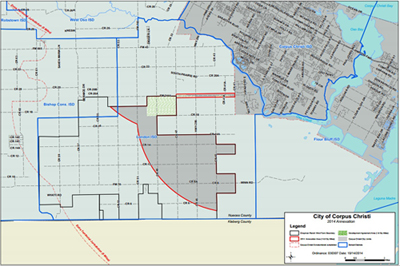
A map of the area where Apex Energy wants to build the Chapman Ranch wind farm alongside recently annexed property by the City of Corpus Christi.
The city of Corpus Christi filed formal objections with the Federal Aviation Administration in June after the FAA approved a $300 million wind energy project planned for Chapman Ranch. Apex Clean Energy applied with the government agency to build 86 turbines on 27 square miles of the ranch in the southern section of the city.
The main concern cited in the letter deals with the possible negative impact the project could have on Navy-owned Air Surveillance Radar located at the city’s airport and the Naval Air Station Kingsville.
“The city is concerned because the project sponsors of Apex Chapman Ranch Wind Farm have been unwilling to acknowledge a fact known in the wind industry and conformed by numerous scientific and government studies: Wind farms interfere with navigational radar,” the letter reads, including two website addresses from energy.gov as backup. “These facts have not been addressed by the FAA findings …”
The letter further cited a March 2014 resolution approved by the council opposing the project, including its plans to “deny any requests for easements across city-owned land for related transmission lines.”
Also, the city promised to use any authority it has to stop the development. One tool already utilized, annexation of 10,000 acres of land in the city’s extraterritorial jurisdiction, did not do the trick. Apex downsized from 175 wind turbines to 86 and moved the location outside city limits.
Council members are now discussing annexing more land, which could cost millions of taxpayer dollars. The city is required by law to provide infrastructure such as water and wastewater in annexed areas. Police and fire protection would also be extended, even if unpopulated.
One council member told reporters he did not think the city had much of a choice.
“This is a terrible way to manage growth,” said at-large council member Mark Scott. “But there’s no other way to manage the enormous impact of something like this.”
Known as Chapman Ranch Wind, Apex officials say the project is expected to generate $57 million in new tax dollars for Nueces County while generating enough electricity to supply 77,000 homes.
The FAA conducted a separate study for each of the 86 wind turbines, evaluating structure and impact. The agency concluded the turbines should cause no problems for area flight systems if properly marked and lighted. An agreement to this effect had already been reached between Apex and the Naval Air Stations in Kingsville and Corpus Christi.
The Navy is conducting its own study of all the current and proposed wind farm developments in South Texas to aid in identifying where further mitigation measures might be required.
Proponents of the project, including Chapman Ranch owner Keith Mueggenborg, said the city’s plan to continue annexing to stop the project interferes with landowner rights. The move could also affect Meuggenborg and his family economically
“This land has been in my family for over 100 years,” Mueggenborg said in a video featured on the Chapman Ranch Wind website. “As much wind as we have here, to let it go to waste is tantamount to taking gasoline and pouring it on the ground to me.”
The video goes on to compare the Chapman project to one built in Oklahoma in 2009. Built with the cooperation of 180 landowners, the wind farms there doubled the tax base in the Calumet Independent School District. The nearby town of Yukon is flourishing, claim residents and officials.
One rancher said the royalty payments from energy produced are keeping many of the ranches in business. Another said she was able to put in new gates and a new fence with no ill effects on wildlife. The turbines also guarantee an income in drought and non-production years.
“The money you make is a blessing to your family,” another farmer said.
The Corpus Christi turbines will be built on active farmland. Each takes up a half-acre of land. Crops are planted right up to the turbine bases. Livestock graze under the blades without harm, the landowners said.
Adding to city objections, the Corpus Christi Chamber of Commerce has long opposed the project, stating that it would stifle growth in the area’s only growth corridor. One Nueces County commissioner has asked the FAA to wait for the Navy to complete its study. Commissioner Mike Pusley wants the FAA to reconsider its stamp of approval.





